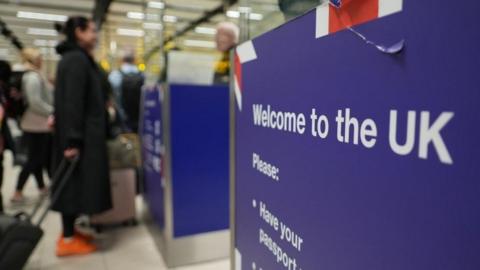
The British government has announced a series of measures to reduce legal immigration, which has reached record levels in recent years. The move comes amid growing pressure on Prime Minister Rishi Sunak, who faces a tough election next year and criticism from his own party over his handling of migration issues.
However, the new policy has been met with opposition from both businesses and trade unions, who warn that it could harm the economy and the public services, especially the health sector, which rely on migrant workers.
Here are some of the key points of the new immigration policy and its potential consequences:
- Higher salary threshold for skilled workers: The government will raise the minimum salary that foreign workers must earn in a skilled job to 38,700 pounds ($48,900), up from 26,200 pounds. This means that many migrants who currently qualify for a work visa will be excluded. The only exception will be for health and social workers, who will still be able to enter with the lower salary requirement.
- Restrictions on family visas: The government will also make it harder for foreign workers to bring their family members with them. Foreign health workers will no longer be able to bring their dependents on their visas, and the minimum income for family visas will be increased. The government will also raise the surcharge that migrants have to pay to use the health service by 66%.
- Review of shortage occupations list: The government will scrap the current system that allows employers to pay migrants only 80% of the market rate for jobs where there is a worker shortage, such as chefs, engineers, and teachers. The list of shortage occupations will be reviewed and reduced, and the government will create a new immigration salary list with fewer occupations.
- Impact on net migration: The government claims that the new policy will reduce net migration by 300,000, from the current record of 745,000. However, this figure is based on assumptions and projections, and does not take into account the possible effects of the policy on the demand and supply of labour, the behaviour of migrants and employers, and the illegal migration flows.
- Impact on the economy and the public services: The new policy could have negative consequences for the British economy and the public services, which are already facing labour shortages and skills gaps. Many sectors, such as hospitality, construction, and agriculture, depend on migrant workers to fill vacancies and meet demand. The new policy could make it harder for them to recruit and retain staff, and could increase costs and reduce productivity and competitiveness. The policy could also affect the health sector, which employs a large number of foreign workers, especially from the EU. The policy could deter migrants from coming to work in the NHS, and could force some existing workers to leave. This could worsen the staffing crisis and the quality of care in the health service.
Reference: reuters.com